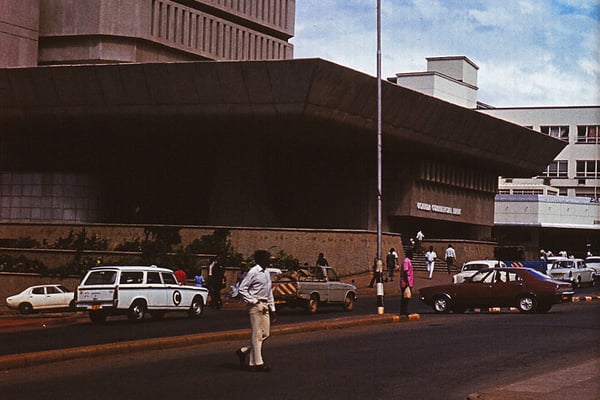
Some of the traders who attended a meeting with President Museveni on May 7 at Kololo independence Grounds over the Electronic Fiscal Receipting and Invoicing Solution. PHOTO / MICHAEL KAKUMIRIZI
In recent weeks, there has been ongoing friction between traders in Kampala and the Uganda Revenue Authority (URA) regarding the current deployment of the Electronic Fiscal Receipting and Invoicing Solution (EFRIS) system among other concerns. The traders have sought redress from the President about various challenges they are facing while doing business. Their pleas cut across different spheres such as the high cost of business operations as well as taxes they are required to pay both at customs border points and within the local marketplace as they attempt to make sales amid a tough economic environment.
Traders have expressed concerns over the customs duty costs as a major pain stemming from the unpredictability of customs duty computation. Traders referred to the fact that URA customs officers ignore the customs values declared based on their commercial invoices and instead opt for “unexplained values”, even where such invoices come from third-party business suppliers.
This practice raises the question on how the value of imported goods ought to be determined to create certainty and consistency for the traders (and importers in general).
Determination of customs values
The customs value of imported goods forms the basis for the determination of various customs duties payable, such as import duty (ranging from 0 percent to 100 percent), Value Added Tax (18 percent), excise duty, withholding tax (6 percent), infrastructure levy (1.5 percent) and environmental levy (depending on the year of manufacture, applicable for vehicles and certain imported appliances).
As with other taxes, there are laws and guidelines in place that URA and taxpayers need to apply to determine the customs value. Uganda being a member state of the East African Community (EAC), the relevant law is the EAC Customs Management Act (EACCMA).
This sets out six different valuation methods which should be followed in a chronological order. These methods in their order are the transaction value method, the identical goods method, the similar goods method, the deductive method, the computed value method, and the fall-back method.
The method that takes priority, based on the EACCMA, is the transaction value method where the value of a good at import is determined based on the commercial invoice from the supplier. The value on the commercial invoice may only be set aside if the URA has sufficient grounds to believe the invoice presented by the trader is fraudulent, or that the relationship between the taxpayer the supplier of the goods may have influenced the price of the transaction. However, even in such circumstances, the taxman is obliged to justify to the taxpayer why their commercial invoice value has been ignored and confirm the basis for applying any of the subsequent methods of valuing the relevant goods.
Secondhand goods may not be presented with proper commercial invoices. In such circumstances, the taxman retains the mandate to use alternative values based on other methods provided for in the EACCMA, such as reliance on the value of identical or similar goods.
The requirement for the URA to put primary reliance on the importer’s commercial invoice has been reinforced by a recent Court of Appeal decision in the case of Testimony Motors Limited vs URA. In this case, the court ruled that the use of alternative methods of valuation without valid reason or in the incorrect order was in contravention of the EACCMA.
The court further held that the Commissioner had no power to exclude the transaction value method as the primary method for valuation. For the taxman to apply the 6th method i.e., the fallback method, (as they have done in the case for traders), the judge affirmed that URA had to show that it had failed to first apply the other five methods of valuation as provided for under the EACCMA.
Based on the case law and the additional tax implications of customs values, it is clear that traders have a valid claim in challenging the position taken by URA in routinely setting aside commercial invoices for new stock in favour of alternative valuation methods.
Two of the key canons of a good tax policy system are fairness and certainty. The amount of tax to be charged should be certain, and this amount should be well-known by the taxpayers in advance so that they can plan effectively. URA, should, therefore ensure that goods imported by traders are valued by the established legal framework on a predictable and non-arbitrary basis. This and other measures such as rigorous sensitisation will enhance a more ready acceptance of the tax system by taxpayers.

Juliet Najjinda.
Juliet Najjinda is the senior manager of Indirect taxes at PwC.




